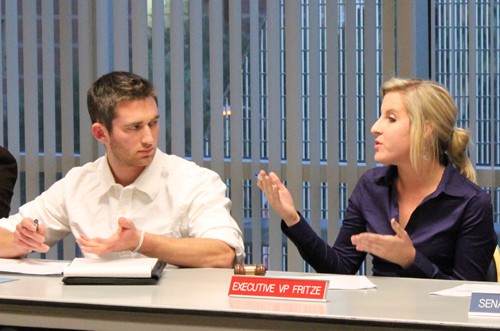Library fee increase to be considered
Students could see an additional $120 added to their school bills if a proposal by University Libraries is passed by the Associated Students of the University of Arizona Senate.
UA Dean of Libraries Carla Stoffle and director Robyn Huff-Eibl asked senators to consider increasing the student fees portion of the library budget from $30 to $150 per student to prevent the loss of electronic databases and the acquisition of library materials.
“”We’ve cut 33 positions out of the staff in the last 27 months,”” Stoffle said. “”We just cut $400,000 in expenditures in the acquisitions budget and we’ll have to take out $600,000 in next years budget unless we get this fee.””
Stoffle said that in addition to cutting the acquisition of books and scholarly materials, online article and electronic book database subscriptions could either be dropped or students may have to start paying for electronic material.
“”We trying to provide material so that you can get the kind of education available at our peer institutions,”” Huff-Eibl said.
According to both women, the UA library system operates on a budget at nearly half of those at comparative institutions like the University of North Carolina at Chapel Hill.
The budget for UA Libraries totals around $21 million, including state funding, student fees, and gifts and endowments from private donors, according to Stoffle.
“”There’s a big gap among our peers where we are,”” she said.
Huff-Eibl said the Fine Arts Library located in the Music building might have to be merged with the Science and Engineering library to cut costs.
Stoffle said that while library budgets have not been cut, they haven’t been increased in several years and the department can no longer continue to do more with less when publishers’ fees continue to rise.
“”We don’t believe it’s going to be good for students to come back every year and ask for a fee,”” she said and suggested the senators pass the fee now which is guaranteed to provide the necessary funding through at least 2012.
Sen. Eduardo Atjian, a public management and policy junior, asked Stoffle if she thought a smaller increase now, followed by a larger increase for freshman in the next few years would solve the problem.
Stoffle said that while she would work with the senators to find appropriate solutions, the current proposal came after lengthy meetings with several schools and departments on campus.
“”We’re going into frightening economic times,”” Quillin said. “”Seeing EBSCO host and JSTOR go away is unacceptable.””
The senators voted unanimously to postpone decisions on this fee until later meetings.
The newly created ASUA student fees advisory board will hold the first of what is said to be several open meetings Friday to discuss proposed new fees like this and the Student Recreation Center’s request for an additional monies to cover staff and facilities maintenance.
Atjian to oversee clothing drive for TUSD
ASUA will hold a Holiday Clothing Drive and all donations will go to benefit students in the Tucson Unified School District. Sen. Atjian is heading up the drive as his senate project and said he hopes that his will continue for many years to come.
“”I see this need and we need to supply it,”” he said.
Atjian attended schools within TUSD for all 12 years of his primary and secondary education before coming to the UA. The drive is set to begin next Monday and will conclude Friday, Dec. 11.
Senator’s objections to fee remain the same
Associated Students of the University of Arizona Senators voted again to hold off on accepting Election Commissioner Justine Piscitello’s recommendations for a $25 candidate campaign materials deposit.
Piscitello initially proposed the fee to prevent candidates who run for ASUA offices from violating campaign media guidelines.
In cases where candidates cover up posters, use laptop computers to gather votes from students on election day or fail to take down their campaign materials, the elections commission can then keep payment.
The new code also suggests a 48-hour window to correct any violations, Piscitello told the senators.
Though Senator Tyler Quillin moved to put the proposition to a vote, multiple objections by Senator Daniel Wallace halted any decisions.
“”I feel this is redundant. It’s just another check system,”” Wallace said. “”I do not feel comfortable at all passing (the election code) with this $25 fee.””
Wallace also said that if any fees are kept, he’d rather they go to ASUA executives or to maintenance crews who would remove the materials.
“”We’d like to see that money going back into elections,”” said Piscitello.
Sen. Eduardo Atjian III said he doubted the fee’s ability to dissuade violations.
“”I feel like we’re beating a dead horse,”” Quillin said.
The Senate must approve an elections code before the end of next week’s meetings.
There was also much discussion over revising the check system used to regulate candidates’ campaigns.
Piscitello’s enforcement procedures are not a part of the election code, and not subject to the senate’s approval at this time.
ASUA Executive Vice President Emily Fritze said the senate may want to look into the guideline enforcement system at later meetings.
Fritze also encouraged the senators to meet with Piscitello before next week to compromise on an election code.









